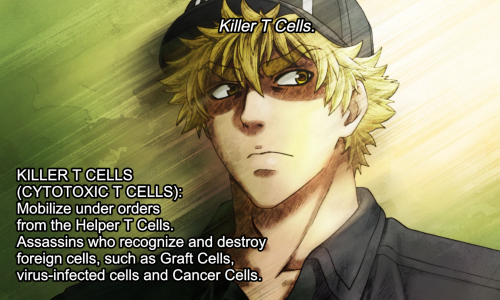Frances Verter, PhD
What are Virus-Specific T-cells (VST)?
 T-cells are immune system cells that can attack cells in the body that have been infected by a virus. Actually, all T-cells are virus-specific, because any given T-cell can only be primed to attack one type of virus1. Once the T-cell is primed to recognize a surface marker on the virus called an antigen, the T-cell will seek out cells that have that marker, bind to them, and release chemicals to kill the infected cell2.
T-cells are immune system cells that can attack cells in the body that have been infected by a virus. Actually, all T-cells are virus-specific, because any given T-cell can only be primed to attack one type of virus1. Once the T-cell is primed to recognize a surface marker on the virus called an antigen, the T-cell will seek out cells that have that marker, bind to them, and release chemicals to kill the infected cell2.
But not everyone carries a numerous and diverse cargo of virus-specific T-cells (VST). Some children are born with immune deficiencies that prevent them from properly developing VST, and some adults have weakened immune systems after exposure to chemotherapy. Researchers are trying to help these patients by building banks of VST isolated from healthy donors. The plan is that when a patient is very sick with a virus that is covered by the bank, they can be treated with an infusion of VST3.
Previous research on Virus-Specific T-cells
Up until the Coronavirus pandemic, most studies of VST were conducted on patients recovering from stem cell transplants. During the first weeks after the transplant while the donor stem cells are engrafting and building a new immune system, these patients are very vulnerable to viral infections from common viruses like herpes simplex virus (HSV), cytomegalovirus (CMV), the Epstein -Barr virus that causes mononucleosis (EBV), or even common cold adenoviruses (AdV).
Clinical trials at major hospital centers have given banked VST to cancer patients for a number of years now4. A widely quoted study at Baylor College of Medicine in Texas found that over 90% of patients recovered within a month of receiving a single transfusion of VST5.
Testing Virus-Specific T-cells as a tool to fight COVID-19
During the first wave of the Coronavirus pandemic, doctors at the epicenter of the outbreak in Wuhan, China, found that COVID-19 drains the T-cell reserves of patients. They compared hundreds of COVID-19 patients to a group of healthy control patients and found that the number of T-cells were dramatically reduced in COVID-19 patients, plus the remaining T-cells were not fully functional6,7. They also found that the sicker patients and the older patients had the worst T-cell counts and T-cell function.
The publication of these findings in spring 2020 helped promote the idea that the most vulnerable Coronavirus patients could benefit from infusions of VST primed to fight COVID-19. Since then, several hospital centers have been isolating VST that target COVID-19 from recovered volunteers and have designed protocols for studies in humans.
Recent Studies
During the month of February 2021, three clinical trials that test VST as a tool against COVID-19 were registered at three different medical centers.
The M.D. Anderson Cancer Center in Houston, Texas, registered clinical trial NCT04742595, titled “Administration of Expanded, Most Closely HLA Matched SARS-CoV-2-Specific T Cells for the Treatment of COVID-19 in Patients With Cancer”. In this early phase 1 study, 16 adult cancer patients that have severe COVID-19 pneumonia will receive daily infusions of COVID-specific VST. The VST will be isolated from the blood of healthy donors and grown in the laboratory to increase their cell count.
The university hospital of Köln, outside Cologne Germany, in partnership with the company, Miltenyi Biomedicine, registered clinical trial NCT04762186. This phase 1 - phase 2 study, titled “A Randomized Phase I/II Trial to Analyse Safety and Efficacy of Adoptive SARS-CoV-2 Specific T Cell Transfer in Patients at Risk for Severe COVID-19”, will treat 51 adult patients that are hospitalized for COVID-19. Initially the trial will give patients escalating daily doses of COVID-specific VST to determine the maximum tolerable dose.
Finally, Thomas Jefferson University in Philadelphia, Pennsylvania, together with the company Tevogen Bio, has registered NCT04765449, titled “Third-Party Covid-19-Specific Cytotoxic T Lymphocytes for the Treatment of Elderly and High-Risk Patients With Covid-19 Infection”. In this phase 1 study, COVID-specific VST will be offered to 24 patients that are at least age 70 and have additional risk factors for poor outcomes of COVID-19 infection. These VST will be isolated from the blood of healthy donors.
Taken together, these recent clinical trials will enroll nearly 100 patients in an ongoing effort to learn how virus-specific T-cells can be used in the battle against the Coronavirus pandemic.
References
- Ask a Biologist. Viral Attack Published 2011-02-15
- Obst R. The Timing of T Cell Priming and Cycling. Frontiers in Immunology 2015; 6:563.
- Children's National Hospital. T-cells from recovered COVID-19 patients show promise to protect vulnerable patients from infection. ScienceDaily Published 2020-10-26
- Harris KM, Davila BJ, Bollard CM, Keller MD. Virus-Specific T Cells: Current and Future Use in Primary Immunodeficiency Disorders. J Allergy Clin Immunology 2019; 7(3):809-818.
- Tzannou I, Papadopoulou A, Naik S, ... Omer B. Off-the-Shelf Virus-Specific T Cells to Treat BK Virus, Human Herpesvirus 6, Cytomegalovirus, Epstein-Barr Virus, and Adenovirus Infections After Allogeneic Hematopoietic Stem-Cell Transplantation. J. Clinical Oncology 2017; 35(31): 3547–3557.
- Moon C. Fighting COVID-19 exhausts T cells. Nature Reviews Immunology 2020; 20:277
Diao B, Wang C, Tan Y, et al. Reduction and Functional Exhaustion of T Cells in Patients with Coronavirus Disease 2019 (COVID-19). Frontiers in Immunology 2020; 11:827